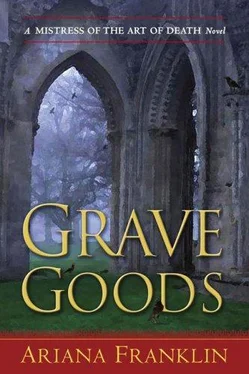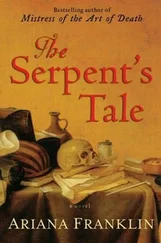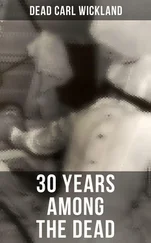“I am so sorry,” she said, and wondered at the inadequacy of saying it, and to whom she had said it.
The fire had spread downhill from the church, leaving the upper slopes of the hill untouched. Up there, two men-one in Benedictine black and the other in the undyed woolen habit of a lay brother-were scything hay, watched over a paddock fence by a solitary mule, all of them forming a pleasing, bucolic miniature, like one on an illuminated manuscript, but throwing into relief the scene from hell that it was edging.
The monk straightened his back, saw them, threw down his scythe, and began running downhill, shouting and waving his arms. “Go back,” he was yelling, “we don’t need you. In the name of the Father, go away.”
Nearer, another monk strode energetically toward them from somewhere on their right in order to intercept the first. “James, Brother James,” he was calling out, “No. No, no, no. Let us remember our manners. If these are the king’s emissaries, they are our saviors.”
He reached them first, smiling. To Mansur, he said, “I give thanks to the king and to Almighty God for your coming. All the world knows of Arab skill in the sciences. I am Abbot Sigward.” He bent his head to each of the women as Adelia introduced herself, then Gyltha, then Allie-who got a special bow-and to Rhys. “Ladies, gentlemen, God’s blessings on you.”
Brother James came cantering up and went to his knees in the cinders. “Don’t let them in, my lord.” Long, nervous hands clutched at the skirt of the abbot’s scapular. “I beg you, send them away.”
“Why?” Abbot Sigward said. “For one thing, I am ready for whatever our good Hilda has in that basket.”
With one hand on Brother James’s trembling shoulder, he led them to the building he’d come out of. It was the only one left standing in the enormous acreage of the abbey’s grounds-a lovely sculpted square of ashlar stone turned a warm yellow by the sun, with a tiled, conical roof rising to an elaborate chimney.
“Once the Abbot’s kitchen,” he said, ushering them in, “now our residence.”
Three quarters of England ’s population would have been glad of it as a residence, Adelia thought. She wouldn’t have minded it herself. It was spacious and cool and functional, though the mason who’d built it hadn’t been able to resist lavishly sculpting stone leaves and fruit into the ceiling’s eight ribs, which curved to meet in a central airhole.
Steps in a corner, where a bucket stood, led down to a dark glint of water. Another corner accommodated vats. A cat was curled up in a pen that also contained a goat. The fireplace beneath the airhole was empty.
Two monks, each with a pestle cupped in one arm, stood by a plain deal table, pounding herbs. One was fat, the other thin.
They glanced up at the visitors, their eyes guarded as they looked from Mansur to Adelia and Gyltha, to Allie, and finally to Rhys.
“Oh, dear God,” said the thin one. “He’s back.”
Rhys bobbed. “ ’Allo, Brother Aelwyn. You remember me, then?”
“Oh, yes,” Brother Aelwyn said.
There were introductions all round. The fat monk was Brother Titus, and his attention, once he’d nodded to them, was on the contents of Hilda’s basket as she began laying them on the table, especially the leather bottle of ale.
“You see,” Abbot Sigward said to Mansur, “we laid a penance on ourselves by sending Brother Patrick, who was our kitchener, to the abbeys in Normandy so that he might beg them for rebuilding money-he has the gift of charm, has Patrick, and an interest in cuisine that will match theirs. Consequently, we are left barely able to cook our own meals. All but one of our lay brothers have departed to find employment elsewhere…”
“Deserted, you mean,” Brother Aelwyn said viciously. “The rats ran away. They think God’s curse is on us.”
“I’m afraid they do,” the abbot said, “and perhaps it is, but at least we are blessed by our sister Hilda’s sustenance.” He smiled at the Pilgrim’s landlady and then at Mansur. “And by your presence, my lord.”
He looked more closely up at the Arab, who remained staring stolidly down at him, unspeaking. To Adelia he said, “Do I gather that the sage does not speak English?”
“I am afraid I must be the doctor’s interpreter and assistant,” Adelia said, using the ploy that had served the two of them well. It was a relief to find Abbot Sigward happy to accept the pronouncements of a Saracen, but she knew that such tolerance would not be extended to her. Prior Geoffrey, bless him, was the one churchman prepared to recognize her skill, but even he only because it had saved his life.
She asked if they had any knowledge of a lady missing with her companions.
They had not. None of them had left the abbey since the fire. “We are the guardians of the few holy relics we managed to save from its burning, you see,” the abbot said, adding, “I am sorry for your anxiety; these are concerning times.”
“Don’t worry about that now, Father,” Hilda told him. “See, I’ve brought ham cured just as you like it, and my quince preserve.” She was noticeably proprietorial toward the abbot, brushing dust off his shoulder, filling a plate for him, producing a napkin that she tried to push into his hand. Nobody else had existed for her since he’d appeared on the scene.
“Any sign of that useless devil as Wells set on us, Father?” she asked.
Indulgently, the abbot fended off the napkin. “We mustn’t assume that Eustace is our arsonist, my dear, nor that the bishop of Wells intended him to be so, though our belief lies in that direction and we have had to tell the sheriff so. But no, so far we have not discovered him.”
“Course he did it,” Hilda argued. “Brother Aloysius said so afore he died, didn’t he? Saw him a-coming from the crypt as it flamed, didn’t he?”
“He said something.”
“He shall burn in hell if he did not in life,” Brother Aelwyn said, “and who else but that satanic bishop would rejoice to see Glastonbury a bonfire? Of course it was Eustace.”
To the still-fussing Hilda, the abbot said, “My dear, it would be discourteous to eat while our guests do not, and I can see that they are eager to be about the king’s business.”
He led the way out of the kitchen. Everybody followed-Brother Titus reluctantly, and covering up the food on the table to keep it from the flies until he should return.
As they headed toward the ruined church, tension rose. The animosity toward Mansur was palpable. Brothers Titus and Aelwyn became even more sullen. Hysterically, Brother James begged his superior not to submit sacred Christian bones to the touch of a Saracen.
Hilda, especially, was on edge. “Them’s Arthur’s and Guinevere’s bones, everybody knows it,” she said over and over, as if by reiteration she could make them so.
Only Abbot Sigward kept his poise. They hadn’t known what to do with the skeletons, he said. “They deserve better housing than our kitchen, so we have built a temporary hut of withies for them on the site of the Lady Chapel, where we trust Saint Mary will watch over them.”
“Should have been two huts for decency,” Brother Aelwyn said.
“My dear, we’ve had this out,” his abbot told him wearily. “This couple have been lying side-by-side all this time; I won’t separate them now.” Suddenly, he winked. “After all, if legend is right, Arthur and Guinevere were respectably married.”
He stopped short of the site, gave Rhys permission to visit the graveyard, then bent down to talk to Allie. “It is time for you to go and play, little one,” he told her. “Old bones are not for the young.”
Allie opened her mouth to explain her experience with bones, but Gyltha, giving her a sharp nudge, said, “We’ll explore, shall us? See what we can find?” And to the abbot, “The child likes animals.”
Читать дальше












